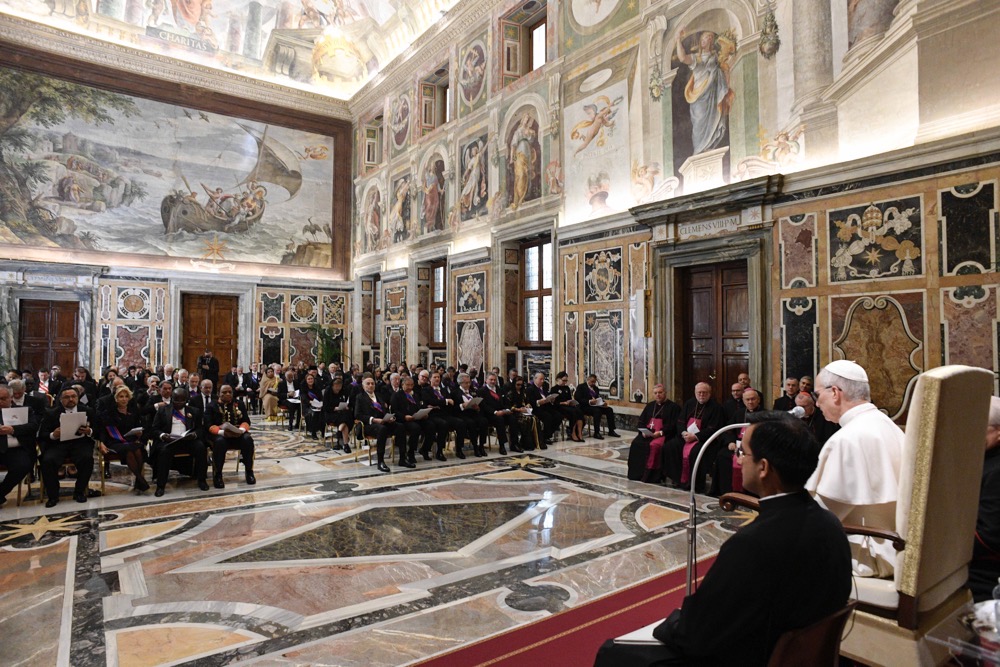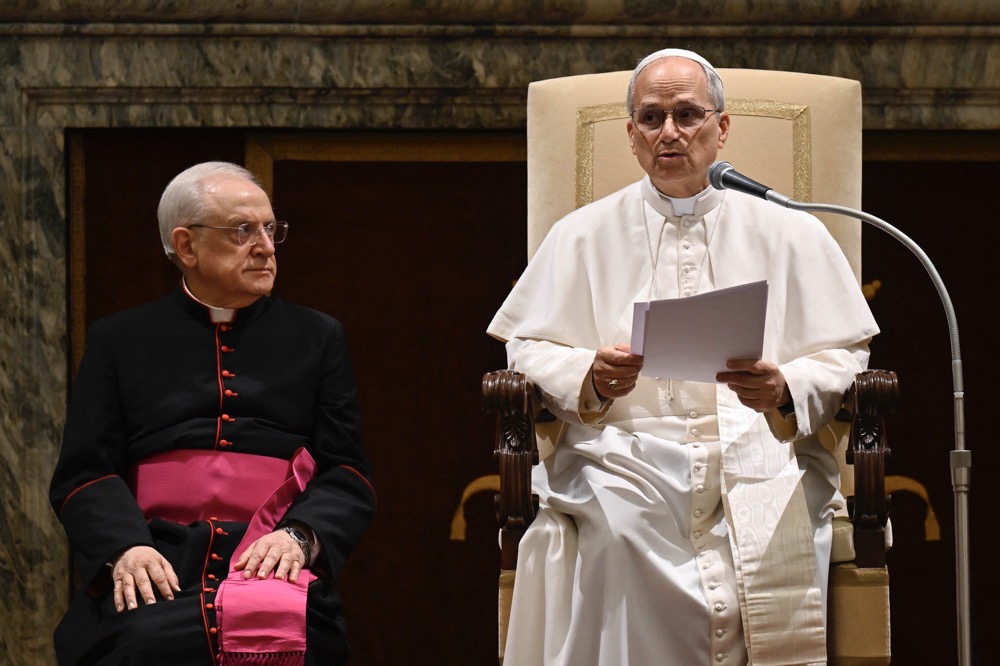LONDON: On May 8, Cardinal Protodeacon Dominique Mamberti stepped onto the balcony of St. Peter’s Basilica and announced the name the world had been waiting for.
With a mix of surprise, joy, and curiosity in the crowd below, he revealed that the College of Cardinals had chosen Robert Francis Prevost as the 269th pontiff of the Catholic Church. He would take the name Pope Leo XIV.
Prevost, 69, had appeared on papabile lists circulated by Vatican watchers, but his election surprised not just the Fantapapa players — a fantasy game for papal predictions — but much of the church hierarchy and media.
For days, speculation had centered around Italian Cardinal Pietro Parolin, the Holy See’s secretary of state, whose role as the Vatican’s number two and deep diplomatic experience made him a frontrunner.

Leo is a reference to Pope Leo XIII, remembered as the pope of Catholic social teaching. (AFP)
As is often the case with papal elections, the secrecy and discernment of the Conclave delivered a choice that defied predictions, leaving the world to piece together a portrait of the new pontiff after the fact.
Despite the Vatican’s characteristic reluctance to comment on its own decisions, the early signals from Leo have offered some insight into the kind of leader he may be.
His papacy begins at a moment when the Western world, in particular, appears to be searching for moral clarity, especially in relation to ongoing conflicts in the Middle East.
Three immediate clues point to the direction Leo may take.
First, his name. As with all pontifical names, the choice is steeped in symbolism. In this case, Leo is a reference to Pope Leo XIII, remembered as the pope of Catholic social teaching.
In 1891, Leo XIII published Rerum Novarum (“Of Revolutionary Change”), an encyclical that addressed the impact of the Industrial Revolution on workers and called for a Church more engaged with modern social issues.
The name suggests Pope Leo XIV may seek to revive that tradition, engaging with today’s global inequalities and the disruptive forces of technology.
The second indication came from his first words as pope. Delivered in eloquent Italian, he issued a direct and urgent appeal: “Peace in the world.”
In an age marked by war in Gaza, violence in Sudan, and prolonged suffering in Syria, the message struck a chord. It was a simple phrase, but one that carried weight, reminding listeners of the Vatican’s potential to offer moral guidance amid geopolitical chaos.
Third, and perhaps most symbolically, is his nationality. As Aldo Cazzullo, deputy editor of Corriere della Sera, noted, the election of the first North American pope inevitably carries geopolitical meaning.

Prevost, 69, election surprised much of the church hierarchy and media. (AFP)
Just as John Paul II’s Polish roots shaped his response to Soviet Communism, and Pope Francis’s Argentinian background informed his focus on the poor and the Global South, Pope Leo’s American identity may influence how he engages with the world’s power structures.
“From his first words after the election and his strong emphasis on peace, it is clear that there will be continuity with Pope Francis, though certainly expressed in his own style and sensitivity,” Bishop Paolo Martinelli, Vicar Apostolic of Southern Arabia, told Arab News.
“The choice of name also seems very significant to me. As he himself explained, choosing the name ‘Leo’ he wants to recall Pope Leo XIII, the Pope of Rerum Novarum, who was attentive to the needs of workers.
“He was the pope who faced the Industrial Revolution and defended the dignity of the human person.”
He argued that by aligning himself with that legacy, Leo may be hinting at a similar approach to today’s challenges, especially the rise of artificial intelligence, labor displacement and pervasive economic inequality.
Martinelli also pointed out that while Leo is American by birth, his missionary work in Latin America has shaped his worldview. “Certainly, the election of a pope is connected to the historical context,” he said. “However, that alone is not enough to explain the cardinals’ choice.
BIO
• Born Robert Francis Prevost in Chicago, Leo is the first North American pope.
• Chose name ‘Leo’ in tribute to Leo XIII, signaling a focus on workers’ rights.
• Former missionary in Latin America, bringing inclusive outlook to papacy.
“Personality and the ability to embody the church in its unity and universality” played a significant role in his election, he added.
Taken together, the opening moments of Leo’s pontificate paint a clear picture of continuity with his predecessor — particularly in advancing church reform and championing peace and justice in conflict zones such as the Gaza Strip.
Just a week into his papacy, Leo is already emerging as a spiritual and moral successor to Pope Francis, especially in matters concerning the Middle East.
“First of all, Pope Leo XIV is the son of migrants,” said Martinelli. “Catholics in the Arabian Peninsula are, for the most part, migrants themselves. For this reason, I believe he may have the right sensitivity to understand the reality of the faithful living in this part of the world.”

The opening moments of Leo’s pontificate paint a clear picture of continuity with his predecessor. (AFP)
Martinelli pointed to Leo’s first greeting and his Regina Caeli address as evidence of his deep concern for the Middle East. “Both were marked by a strong appeal for peace,” he said. “I am confident that his commitment to peace will be both concrete and consistent.”
Francis, who appointed Leo to key Vatican roles and made him a cardinal in 2023 following years of missionary work in Peru, had been a vocal critic of the wars in Sudan, Gaza, Syria and Yemen.
His remarks — often perceived as a rare moral stance in the Western world — strained relations with Israeli officials. In the days after his death, Israeli embassies were instructed to remove public condolences, and most senior leaders boycotted his funeral.
In contrast, Leo has delivered repeated appeals for peace, both in public appearances and private meetings. Though simple in tone, his words appear to resonate, especially in a region exhausted by conflict.
On May 14, he praised Christian communities in the Middle East who “persevere and remain in their homelands, resisting the temptation to abandon them” despite war, marginalization, or persecution — remarks seen as a veiled reference to the ongoing displacement of Christians from the West Bank by Israeli settlers.
Unlike his predecessor, whose forthright condemnations sometimes led to diplomatic fallout, Leo has so far adopted a more measured yet persistent tone. “I believe his words clearly indicate the path he intends to follow, and they will surely be well received in the Gulf region and throughout the Middle East,” said Martinelli.
While avoiding direct criticism of Israeli or Western leaders, Leo has offered to mediate between warring parties and pledged to “make every effort so that this peace may prevail.”
He also cautioned against framing ongoing conflicts as binary and simplistic narratives that divide the world into good and evil, stressing the need for dialogue — not just between political leaders, but among religious communities — as the only path forward in times of deep moral and societal crisis.
“The commitment to dialogue between people of different faiths is extremely important — vital in an age where religion still risks being exploited for nationalistic purposes,” said Martinelli.
“Committing violence in the name of God is always a betrayal of true religious experience; it is a misuse of religion.”

The secrecy and discernment of the Conclave delivered a choice that defied predictions. (AFP)
For Martinelli, peace in Gaza and across the region must be rooted in interfaith dialogue — particularly between Catholicism, Judaism, and Islam — if it is to be credible and sustainable in a region long marred by sectarian violence and instability.
That dialogue gained fresh momentum during Francis’s historic 2019 visit to the UAE, the first ever papal visit to the Arabian Gulf.
There, Francis and Sheikh Ahmed El-Tayeb, Grand Imam of Egypt’s Al-Azhar Mosque, signed the Document on Human Fraternity, a groundbreaking call to reject violence and extremism.
That message was amplified again during Francis’s 2021 pilgrimage to Iraq, a journey viewed by many as an attempt to mend bridges between the different faiths in the country.
“Pope Francis’ commitment to interreligious dialogue — expressed most notably in his visit to Abu Dhabi and the signing of the Document on Human Fraternity — belongs to a well-established tradition in the church,” Martinelli said.
“This seems to me to be an irreversible path for the Catholic Church. For this reason, I am confident that Pope Leo XIV will carry forward and deepen this journey, which is also essential for promoting peace and reconciliation in the world.”
While it is still too early to say whether Leo will launch new diplomatic initiatives in the region, his early statements suggest that he could seek to position the Vatican as an active mediator, as Francis once did during the Syrian conflict.

Leo has delivered repeated appeals for peace, both in public appearances and private meetings. (AFP)
All signs point to Leo adopting a tone of moral clarity reminiscent of his predecessor: condemning violence, encouraging interfaith cooperation, and offering hope.
What remains uncertain is how effectively he will balance this moral authority with the pragmatic demands of a volatile geopolitical landscape.
What is clear, however, is that the Chicago-born missionary is likely to build on Francis’s diplomatic legacy — one that transformed the Vatican into a modern soft-power institution rooted in moral imperatives.

























